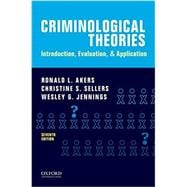With a focus on empirical evaluation and practical application, Criminological Theories: Introduction, Evaluation, and Application, Seventh Edition, helps students draw connections between criminological theory and practical applications. In clear, engaging language, authors Ronald L. Akers, Christine S. Sellers, and Wesley G. Jennings explore each principal criminological theory using a three-part analysis:
An Introduction presents a succinct exposition of the theory's central concepts, assertions, and hypotheses
An Evaluation provides a detailed critique of the theory, with an emphasis on empirical validity
An Application extends the evaluation to determine each theory's relevance and its potential for controlling and preventing crime and delinquency








